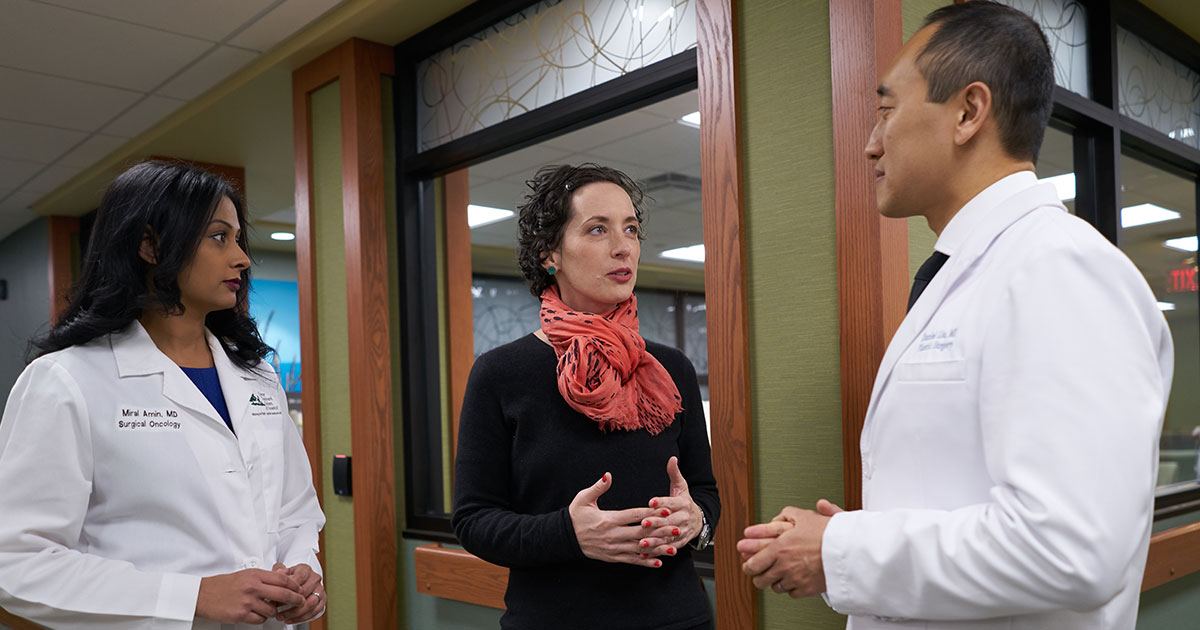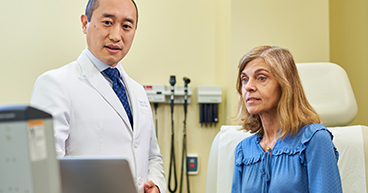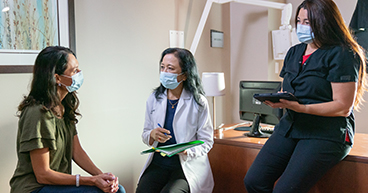
In 1849, Elizabeth Blackwell, who was turned away by no fewer than 10 medical schools, broke the gender barrier and became the first woman to earn an American medical degree. In 2019, 170 years later, more women than men were enrolled in medical school.
Women and men walk the same paths to acquire a medical education. They attend similar schools, take the same tests and do internships, residencies and continuing education. Gone are the days of Dr. Kildare, when all the TV doctors were men and all the nurses were women. Thousands of women are practicing as medical doctors and osteopaths in the United States today.
Even though there are more female doctors than ever before, some patients still may prefer to see a male doctor. In some cases, the preferences are driven by attitudes about gender that are rooted in classic stereotypes.
“I have had patients switch from me to men because they thought men were smarter or better surgeons or they looked more experienced,” says Ruchi Garg, MD, Gynecologic Oncologist at Cancer Treatment Centers of America® (CTCA), Atlanta. “I discourage patients from allowing stereotypes, such as ‘men are smarter’ and ‘women are more empathetic,’ from getting in the way of patient care."
In many cases, however, the choice is driven by comfort levels often connected to the condition being treated.
For instance, in a study of breast cancer patients, most women said they valued technical skill, experience and knowledge over the doctor's gender. But 32 percent said they preferred being examined by a female breast surgeon, citing “embarrassment during the examination” as the major reason for their choice.
“Of course, it’s about the comfort level for the patient,” Dr. Garg says. "But in my experience, male gynecologists and female urologists are equally competent and have similar capacities for empathy.”
Comparatively, in a study of men with suspected prostate disease, 55 percent of those surveyed said they preferred to be treated by male urologists.
“Some male patients find it uncomfortable to be examined for certain types of conditions, such as erectile dysfunction and prostate disease,” says Shawn Blick, MD, Urologic Oncologist and Men’s Health Specialist at CTCA® Phoenix. “If a male patient specifically asks to see me, I make myself available to accommodate that request. However, I’ve found that if a clinician is professional, confident in his or her approach and communicates effectively, gender doesn’t matter to most patients.”
Your doctor’s communication style is key
Studies show that your doctor’s communication style is more influential than gender in helping or hindering how well you understand your diagnosis and your willingness to accept and follow a prescribed treatment.
Researchers at Johns Hopkins Bloomberg School of Public Health analyzed a number of studies that focused on how doctors communicate. They found that female primary care doctors spent more time listening to patients and engaged in more patient-centered communication than their male colleagues. The study defined patient-centered communication as:
- Avoiding medical jargon
- Not interrupting patients when speaking
- Taking each patient’s circumstances into consideration
- Asking open-ended questions
- Encouraging patients to voice their concerns.
“In our culture, it’s generally believed that women are better communicators than men,” says Dr. Blick. “However, both male and female doctors have the opportunity to be excellent communicators.”
He says that most doctors aren’t taught communication skills in medical school, so they need to develop them. “When a doctor takes the time to build rapport, articulates information clearly and is sensitive when discussing topics that can be uncomfortable, such as genitalia and sexuality, gender becomes a non-issue,” he adds.
In a study of physician communication styles, patients of doctors who used patient-centered communication were more likely to retain information and accept their recommended treatment plans. The same study concluded that a patient-centered communication style helped build trusting relationships between patients and physicians and improved patients’ evaluations of their doctors.
“I’m a proponent of looking at the whole person,” says Dr. Blick. “I don’t treat lab results, I treat people, and they have real-life issues they’re dealing with. Family and job concerns may have an impact on how well patients are able to tolerate their treatment and what types of support they need.”
Do your research
You can set the stage for building better rapport with your doctors, no matter their gender, by adopting the attitude that they’re on your side. If your physician recommends a medical test or treatment that you’ve read negative comments about on social media or elsewhere, ask for clarification and try to keep an open mind. Medical treatments, including diagnostic exams and treatments for cancer, are based on decades of research, including clinical trials.
“It’s important to find a doctor you feel you can trust,” Dr. Blick says. “Most of my patients do online research before they consult with me, and I welcome their educated questions and am open to discussing their concerns. However, if a patient is ‘on guard’ or immediately dismisses my opinion, it can be difficult to provide the best care possible, which is what doctors aim to do. It’s part of our oath.”
Patients can also help by preparing for their appointments. For example, write out a list of questions focused on your concerns, so you don’t forget to ask something that’s important to you. This may also help guide the conversation and make the most of your doctor’s limited time.
Learn 10 questions to ask your doctor during your first visit
Ask questions
Another way to prepare, especially if seeing a doctor for the first time, is to research his or her background, including education, training and experience. Dr. Blick recommends reading your doctor’s online ratings and reviews. “Be sure to read all of the comments, and not just focus on a handful of negative ones,” he cautions.You can find background information about doctors and patient ratings on websites such as Healthgrades. Look specifically for:
- Where did the doctor attend medical school?
- What are the doctor’s areas of specialization and training?
- Is the doctor board certified in his/her specialty?
- How many years has he or she been practicing?
When preparing to meet with a cancer doctor the first time, asking probing questions may help you understand important information about your cancer diagnosis. Questions you may want to ask include:
- How many patients have you treated with my specific type of cancer?
- How many patients with my cancer type are seen at the center/hospital where you practice?
- Is there a team that works together to determine my treatment plan and/or options?
- (If you know you need a specific procedure: How many of these procedures have you performed?
- What complications have you encountered with the procedure, and what are my risks for complications?
- What additional resources are available to me during treatment and after?
Don’t be afraid to meet with more than one oncologist. A second opinion may reveal additional treatment options for your type and stage of cancer or confirm a current treatment plan. Some treatment options may result in a speedier recovery, with fewer side effects and a better prognosis.
When considering your doctor’s gender, Drs. Blick and Garg agree that it’s important to understand your own comfort level with being examined by a physician of the same sex and to choose accordingly.
The bottom line: If you feel more comfortable with your doctor, you’re more likely to communicate better, which likely means you’re more likely to follow the prescribed course of treatment, and that tends to result in a better outcome.
Learn what to consider before changing your medical oncologist.



